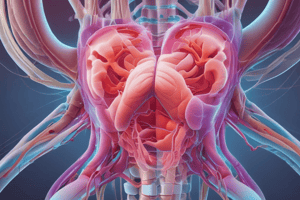Podcast
Questions and Answers
What is the piezoelectric effect?
What is the piezoelectric effect?
The piezoelectric effect is the ability of certain materials to generate an electrical charge in response to applied mechanical stress.
Flashcards are hidden until you start studying
Study Notes
History and Definition
- Ultrasound uses high-frequency sound for medical diagnosis and treatment.
- It was discovered in the 1880s.
- Ultrasound frequencies are above the upper limit of human hearing (20,000 Hz).
Piezoelectric Effect
- The piezoelectric crystal, used in transducers, converts electrical current into ultrasound waves and vice versa.
Pulse-Echo Principle
- Ultrasound waves are generated and sent into tissues.
- Waves interact with tissues, generating echoes.
- Echoes are received back by the transducer.
- The transducer converts echoes into image data.
Ultrasound Frequencies
- Common frequencies used in medical imaging: 2 - 20 MHz.
- Lower frequencies penetrate deeper into the body.
- Higher frequencies provide better resolution and image detail.
Transducers
- Frequencies vary depending on clinical use:
- 2.5 MHz: Deep abdomen.
- 3.5 MHz: General abdominal and pelvic imaging.
- 5.5 MHz: Vascular imaging.
- 7.5 MHz: Breast and thyroid imaging.
- 10 MHz: Superficial musculoskeletal imaging.
Ultrasound Knobology and Settings
- Power Button: Turns the ultrasound machine on.
- Probe Selection: Choose the appropriate transducer for the desired imaging area.
- Application Preset: Sets default parameters for specific imaging applications (e.g., abdomen, breast).
- Depth: Determines the section of the body being imaged.
- Gain (Overall): Amplifies the strength of the ultrasound signal.
- Near/Far Field Gain & Time Gain Compensation (TGC): Adjusts amplification of the signal at different depths to compensate for attenuation.
- Focus: Sharpens the image by focusing the ultrasound beam at a specific depth.
Ultrasound Modes
- B-mode (Brightness Mode): Displays structural information using different shades of grey.
- M-mode (Motion Mode): Captures echoes along a single line and displays them over time, showing movement.
Studying That Suits You
Use AI to generate personalized quizzes and flashcards to suit your learning preferences.




